- Home
- Beryl Kingston
Avalanche of Daisies Page 2
Avalanche of Daisies Read online
Page 2
Instincts sharpened, he recognised threatened pride and realised that he would have to disguise his noble intentions. ‘Actually,’ he said, ‘I did it for my friend. He was looking for a punch-up.’
‘Thass all right then,’ she said, and grinned at him, her face devilish. ‘What’ll they do to him?’
‘Depends how lippy he is,’ he said and was going to suggest a few lurid possibilities when another young man manoeuvred his partner into position alongside them and leant towards them to talk to her.
He wore the navy-blue jersey and serviceable trousers of the merchant seaman, but his calling would have been obvious even if he’d been wearing civvies. Everything about him proclaimed it, from his mop of dark curly hair, his tanned face and sea-blue eyes, to his rolling gait and his jaunty air and the strong smell of salt and cheap cigarettes that blew in upon them as he talked.
‘You all right, kid?’ he asked, looking at Barbara.
‘’Lo Norman,’ she said. ‘’Course. What d’you imagine?’
He grinned at her. ‘Just checkin’. He didn’t hit you or nothin’?’
‘He wouldn’t dare,’ she said, grinning back.
‘We heard him hollerin’ the other side the room,’ the girl put in.
‘I kicked him in the shins.’
‘You would,’ Norman laughed. ‘You lead him a dog’s life, poor ol’ bor.’ And they danced away.
‘Who was that?’ Steve asked. They looked so alike he was sure this one was a relation.
‘My big brother,’ she said proudly. ‘He’s in the merchant navy. Atlantic convoys mostly. He’s home on leave for a few weeks. He thinks he’s got to look after me when he’s on leave. Daft ol’ bor! The girl he’s dancing with is our cousin.’
Steve felt compelled to ask his next question. ‘Is Vic a cousin too? I mean, you’re not related or anything are you?’ It didn’t seem likely but the gawk had been acting as though he was a boyfriend. All that business about ‘you’re my gal’.
She stiffened in his arms and leant back to frown at him. How quickly and entirely her expression could change. She was never the same two minutes at a time. Now, with her lips pursed and her eyes narrowed, she looked like a vixen. ‘No,’ she said. ‘We ain’t.’
‘My mistake!’
‘He live round the corner,’ she explained. ‘We were at school together – till he went to the grammar. That was half his trouble, goin’ to the grammar. Gave him ideas. Made him big-headed. I went out with him a few times. Last summer. Now he reckon he owns me. Which he don’t.’
They danced without speaking for a minute or two, or to be more accurate, they swayed gently from foot to foot. The floor was too crowded for anything more adventurous and in any case the waltz was slowing to a halt. Her expression was changing again, growing dreamy.
‘How about the next one?’ he offered when the music stopped. He couldn’t just escort her from the floor and say goodbye to her. Not now.
They were announcing the next dance and it was a quickstep. ‘Yes,’ she said. ‘Why not? D’you jitterbug?’
He didn’t. Couldn’t. The mere idea made his heart jump. But the need to go on talking to her was stronger than his alarm. ‘I’ll have a go,’ he said.
It was a disaster. The music was too quick, he didn’t know which way to turn or what to do with his feet or his arms, he trod on her feet and bumped into everybody within range. Within seconds she was laughing at him, her face spread and lifted the way it had been when she first joined him on the floor.
‘Sorry!’ he apologised. ‘I’m not much of a dancer.’
‘You can say that again,’ she agreed cheerfully. ‘You’re like an elephant.’
This time he wished she wasn’t quite so outspoken. ‘Thanks!’
She laughed at him again. ‘Never mind. I’ll teach you. I’m good with elephants. There’s nothin’ to it once you get the hang of it. Watch my feet and do what I do.’
He allowed himself to be led, following the beat. She put her hands on his shoulders and pushed him in the direction she wanted him to go, twisting his body first this way and then that. Then she seized his hand and made him turn her, ducking underneath his outstretched arm as if he were leading her and grinning up at him as she turned. There was no possibility of talking. It was all he could do to follow the moves. But the excitement of dancing this amazing dance with this amazing girl more than made up for it. By the end of it all he wasn’t simply out of breath, he was bewitched.
‘There!’ she said, as he walked her back to her friends. ‘What d’you think? Four more dances an’ you won’t know yourself.’
‘Can I have four more dances then?’
She gave him her daring expression. ‘If you like.’
‘I thought you’d say, “Never again.” I mean after the way I trod on you.’
‘You’re a challenge,’ she laughed at him. ‘I’m a great one for a challenge, me.’
They were almost at her table, where four or five girls were waiting for her, all questioning eyes. He’d have to be quick. ‘Next waltz then,’ he asked.
The next waltz it was, and the next, and three more valiant attempts at the jitterbug, each one marginally better than the last. Then, and a great deal too soon for his liking, it was the last waltz and the lights were dimmed so far that he couldn’t see anything except the gleam of her eyes, the tender sweep of those long thick eyelashes and the outline of that expressive face. She was dancing dreamily again, her lips slightly parted. It would be the easiest thing to lean towards her and kiss them. Oh the easiest, most wonderful thing.
‘I’ll walk you home,’ he offered, and was annoyed that his voice was suddenly so husky that he had to cough to clear it. ‘I mean, that feller might be hanging around.’
‘He’ll be with his mates,’ she said easily. ‘Thass where he’ll be.’ She didn’t sound, or look, the least bit troubled.
‘I’ll walk you home,’ he insisted. ‘See you to your door.’
‘Thass only round the corner,’ she said. ‘I usually go with my friends.’
‘I’ll walk you all home then,’ he said. Better to be one of a crowd than to end their evening now. ‘Safety in numbers.’
She laughed at that. ‘Wait till you seen ’em till you start sayin’ things like that,’ she warned.
They were a noisy lot and there seemed to be dozens of them, all milling about and joshing one another as they waited for her to get her coat. ‘Hassen you up!’ they called after her in their Norfolk burr. ‘We hain’t got orl day!’
After half an evening spent in her company, the coat was just what he expected her to wear. It was a scarlet wraparound jacket, with a hood to cover her wild hair and a tie-belt to pull about her waist, bright, bold and very suitable.
‘Red Riding Hood,’ he teased, as they inched towards the exit.
She grinned at him. ‘Onny I eat the wolf!’
I’ll bet you do, he thought. But there wasn’t time to say anything because she’d gone on ahead of him.
He followed her through the double barrier of the blackout and into a sudden slap of cold air and total darkness. As always on a black night, it took a few seconds for his eyes to adjust. He could just about see that his truck was waiting in front of the hotel where it had dropped him off but the buildings round the square were simply black silhouettes against the Prussian blue of the sky. After the noise and warmth of the dancehall the square was cold and all sound either distant or diffused. Chirruping voices retreated, calling good night, army boots scuffled the pavement, high heels squeaked and clicked, and somewhere to the right of them, unseen bicycles rattled over the cobbles and someone was cranking a car.
‘Right then,’ he said. ‘Which way?’
‘Follow the others,’ Barbara said. Her friends were already heading north out of the square. She thrust her hands deep into her pockets, and shivered as she strode off. For a second he wondered whether he could hold her hand or put an arm round her shoulders, then he decided he’d bett
er ask first.
‘I suppose I’d get thumped if I was to offer you my arm.’
‘Yes,’ she said. ‘You would. I’m an independent spirit, I’ll have you know, not some ol’ lady with a walkin’ stick.’
So they walked on sedately, side by side, she still shivering, he struggling to think of something to say. Something non-committal. Or a joke maybe. She didn’t seem to notice his silence. Or perhaps she just wasn’t troubled by it.
In fact the expression on his face was making her feel guilty. Well not exactly guilty. That was too strong. Aware that she might have hurt his feelings. It was a novel sensation. Usually she rebuffed advances without giving a thought to the consequences. But this time it was different. This time she felt she had to make amends.
Presently she turned her head towards him and asked him a question. ‘You come from London, don’t you?’
Relieved to be talking again, he was happy to admit that he did.
‘Whereabouts in London?’
They were halfway across the square. ‘New Cross,’ he told her.
‘Where’s that?’
‘South-east. Near Greenwich.’
‘Ah!’ She’d heard of Greenwich. ‘I’ve always wanted to go to London. Never have, with the war an’ everything. What’s it like?’
He was at a loss to know how to begin to tell her. ‘Big,’ he said, at last. ‘Friendly. We live by the station. My dad’s a signalman. Well one of the stations, I suppose I should say. We’ve got two.’
‘So have we,’ she said, not to be outdone.
‘Not in the same road though. Not side by side in the same road.’
That she allowed. ‘An’ now you’re going to France.’
‘That’s the plan.’ He tried to sound as though he was making light of it, but it was a moment of pride to admit it, just the same. It reinstated him.
Her friends were turning a corner, giggling, their dark silhouettes disappearing into the shadows.
‘I think you’re very brave,’ she said. ‘Knowin’ you got to go, knowin’ you got to fight.’ And she thought, knowing you might get killed.
‘I’ve known that since the start,’ he told her seriously. ‘I mean, I was fourteen when the war broke out so I knew I was bound to be in it, sooner or later. After Dunkirk, I mean, well we all knew then.’
‘I was twelve when it started,’ she told him. ‘Still at school. I suppose you were out to work.’
They turned into the dark lane. He would have to admit to his education now and, after what she’d said while they were dancing, he was afraid she might disapprove of it. ‘Well no,’ he said. ‘I was at school too. I stayed on till I was eighteen. I was at grammar school.’ And when she didn’t comment, ‘It doesn’t give us all the wrong ideas. I mean, we don’t all throw our weight around like that Vic feller. Some of us are quite nice.’
‘You mustn’t mind what I say,’ she told him looking at him seriously. ‘That was just sour grapes talkin’. I was better’n him when we were at St Nick’s. I used to come top a’ the class most weeks. Drove him crackers. He wasn’t the only one to win a scholarship. I got one too. Only he went to the grammar an’ I didn’t. Thass the difference.’
He was shocked to hear such a thing. ‘But that’s terrible,’ he said. ‘D’you mean to say you won a scholarship to a grammar school and didn’t take it?’
‘Couldn’t afford to,’ she said, shrugging her shoulders. ‘Anyway girls don’t. Leastways, girls what live in the North End don’t, an’ thass about all there is to that.’
‘Well it shouldn’t be,’ he said hotly. ‘It’s a waste. And it’s not fair. If you had the brains to go to a grammar school, you should have gone.’
‘Well it’s done now,’ turning her face and her mind away from the subject. ‘No use cryin’ over spilt milk. There’s nothing I can do about it.’
‘Not now, maybe. But when you’re twenty-one you can do something.’
‘Like what?’
‘Like vote for a different government,’ he told her. ‘One that’ll make some changes.’
They’d reached a dark alleyway. ‘We’re here,’ she said. ‘I live just up the alley.’
‘Come on then,’ he said, turning into the darkness.
The offer felt like an intrusion. ‘You don’t have to come all the way,’ she said. ‘I can make my own way now.’
‘I’m taking you to your door,’ he said firmly.
‘But this is the North End,’ she warned. ‘I mean …’
‘To your door,’ he said, leading the way.
‘Wait till I light my torch then,’ she said. ‘Thass a death-trap along here. I don’t want you walking into bike or nothin’.’
The alley led into a yard, very dark and evil-smelling, like a cross between a fish shop and a dirty public lavatory. Two rows of small houses stood facing one another across the uneven cobbles. There was a runnel down the centre where he caught a glimpse of water, and odd dark shapes in every corner, mangles, buckets, bicycles, tin baths, an old pram, a ladder, swathes of nets. She was right about the need for a torch.
She led him through the yard, round the corner alongside one of the houses into another, and through that into a third.
‘Thass a proper ol’ rabbit warren,’ she said, stopping at last in front of one of the dark doors and speaking in a whisper. ‘I did warn you.’
He whispered too. ‘Is this where you live?’
‘Yup. This is where I live. This is Rag’s Yard.’
He was almost as horrified by the yard as he’d been by her deprived education. ‘What, all of you?’ he asked, wondering how they all fitted in. ‘You and your brothers and … everything.’
‘No, not my brothers and everything,’ she said, stung by his implied criticism. ‘Just me an’ my aunt. I had to move out when Jimmy was born. There wasn’t room for all of us at home.’
He was more horrified than ever. Fancy being moved out of your own house because there wasn’t room for you. But he didn’t say anything because he’d annoyed her enough already. And besides, he was trying to find the words to ask her to go out with him again.
‘Look,’ he said, forgetting to whisper. ‘You don’t have to work tomorrow or anything, do you? I mean being Sunday …’
She put a finger to her lips in warning and answered him very quietly. ‘I help my aunt with the housework of a Sunday.’
‘But not all day,’ he urged, this time remembering to whisper. ‘I mean, I could get a couple of hours off in the afternoon. I could get a bus over. We could go for a walk or something. Or the pictures. I mean if you’d like to.’
She was caught between annoyance at his criticism and curiosity about what it would be like to go out with him. She looked up at him for such a long time, while she considered it, that the wait made him breathless. Then curiosity won. ‘All right,’ she said. ‘Where d’you want to meet?’
‘By the Corn Exchange. Half past three.’
It was agreed. This gorgeous, extraordinary girl was going to see him again. He’d made a date. He was so happy he wanted to leap about and shout. It took all his self-control to restrict himself to shifting his feet.
‘Yes. You’d better go,’ she said misinterpreting the signs. ‘Take my torch, or you’ll never find your way out.’
But even with the torchlight to guide him, he was in a state of such clumsy elation, he tripped over a bucket and stumbled into a mangle.
Her whispered query breathed across the alley. ‘You all right?’
‘Two broken legs,’ he joked back. ‘Few cracked ribs. Never felt better.’
‘Idiot!’ she laughed. And opened the door.
Chapter Two
It was very dark inside the house, for the blackout curtains were drawn, the oil lamp was out and the fire had dwindled to a single coal which was little more than a pink glow in a heap of whitening ash and gave out no light at all. Fortunately, being in the dark didn’t worry Barbara Nelson. Not that she would have admitted to it if it
had. Having grown up in the North End, with a harsh-tongued fisherman for a father, she’d learned to keep her fears hidden from a very early age. In fact, it was her mother’s proud boast that ‘our Babs’ was the toughest thing in shoe-leather. ‘Blust gal!’ she would brag to her neighbours. ‘She don’ turn hair fer nothin’.’
Until that evening Barbara had shared her opinion. Now she wasn’t quite so sure, for her hair was bristling from nape to forehead and her head was so full of unfamiliar emotions that she felt quite giddy under their impact. Had she really agreed to go out with a soldier? She, hard-to-get, wise-cracking, independent Spitfire Nelson, the girl who made mincemeat of wolves? What on earth had got into her?
She picked her way through the furniture to the mantelpiece, scrabbled her fingers along it until she found the candlestick and matches and produced a light. But then, instead of removing her coat and tiptoeing upstairs to bed as she usually did on a Saturday night, she stood before the hearth, candlestick in hand and leant forward towards the mirror. She’d never been vain. She was too busy and too sensible for that. So it was most unlike her to spend time gazing at her reflection. But everything she’d done that evening had been unlike her – at least everything she’d done after she met Steve Wilkins. Just talking to him had made her feel special. And the look on his face when he’d asked her out had been the best of all. That had made her feel beautiful. To remember it made her blush, even there in the chill of that small cold room.
She put her free hand against her cheek to hold back its rising warmth, and thought how silly she was being. She wasn’t beautiful. She was just Barbara Nelson who lived in the North End and was very ordinary.
But the person who gazed back at her from the mirror was unlike any image of herself she’d ever seen. The funny face she’d accepted until then, with its odd-shaped nose, its rough skin and its mop of uncontrollable hair, had been transformed. What she saw now was almost ethereal, heart-shaped and dreamy and set off by a halo of thick, dark, contented curls, with skin the colour of apricots, brow and cheekbones gilded by candlelight, eyes huge and lustrous. She gazed and gazed until her breath misted the glass. How could she look so serene when her thoughts were in such a turmoil?

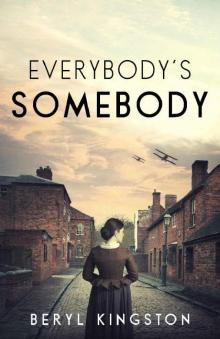 Everybody's Somebody
Everybody's Somebody Sixpenny Stalls
Sixpenny Stalls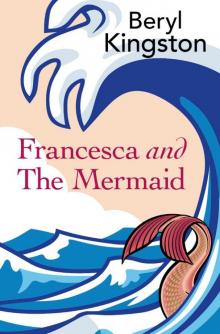 Francesca and the Mermaid
Francesca and the Mermaid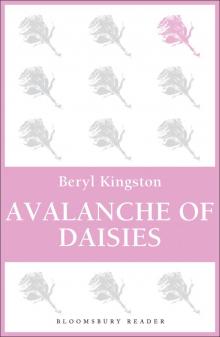 Avalanche of Daisies
Avalanche of Daisies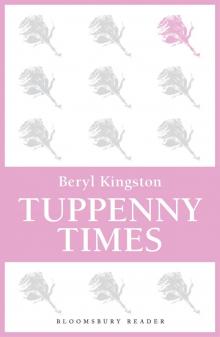 Tuppenny Times
Tuppenny Times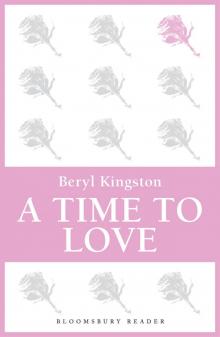 A Time to Love
A Time to Love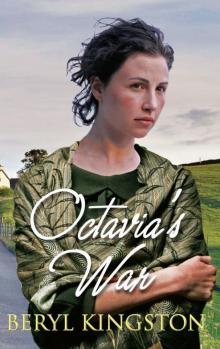 Octavia's War
Octavia's War Gemma's Journey
Gemma's Journey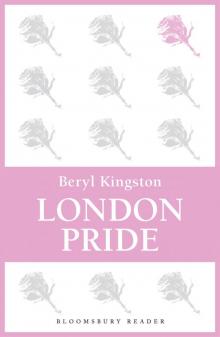 London Pride
London Pride Gates of Paradise
Gates of Paradise Octavia
Octavia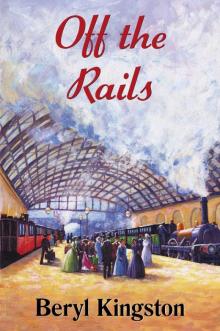 Off the Rails
Off the Rails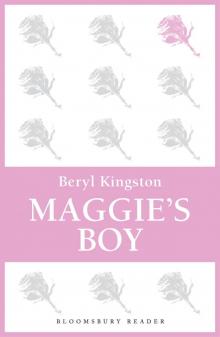 Maggie's Boy
Maggie's Boy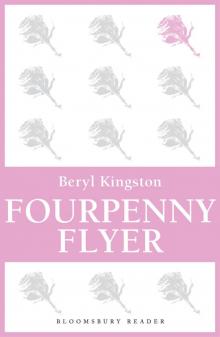 Fourpenny Flyer
Fourpenny Flyer